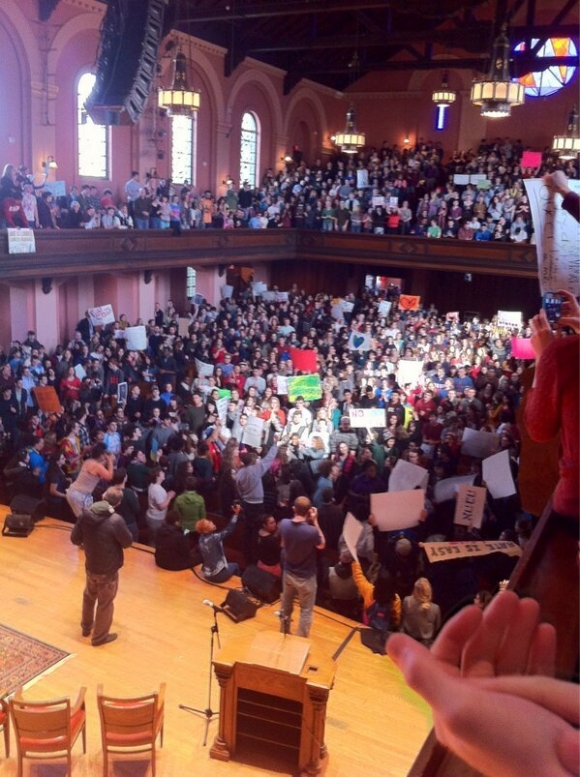After a series of racist, homophobic, queerphobic, and anti-Semitic vandalism cumulating in the sighting of an individual dressed in what appeared to be KKK regalia outside of Oberlin’s Akfrikan Heritage House the night of March 3rd, (a full timeline of the vandalism can be found at the Oberlin Review Here) the administration of Oberlin College superseded classes on March 4th in favor of holding a “day of solidarity”.
The events on Monday included a teach-in at the Afrikan Heritage House, a march promoting campus-wide solidarity, and a convocation in Oberlin’s main performance and lecture space.
WOBC, Oberlin’s College and Community radio station recorded the events of all of the daily events as well as statements from College groups and students which can be found online at www.wobc.org.
In an e-mail to Oberlin Alumni, Danielle Young, the Executive Director of the Alumni Association wrote that “During the last several weeks, incidents of hate speech have appeared on campus and on popular social media sites, including racist, anti-Semitic, and homophobic defacing of posters that were advertising events and programming. The administration has taken a very immediate and visible response.”
The College’s president, Marvin Krislov told the student body “From what we have seen we believe these actions are the work of a very small number of cowardly people” while Lt Mike McCloskey of the Oberlin police department told the Guardian "My understanding is that the individuals are college students and they have been identified. They are no longer on campus. The college is dealing with it internally, and we have been working in co-operation with the college."
Despite these claims, and general campus support for the college’s swift action, some students have expressed the opinion that the College is sitting on its historic progressive actions towards race and sex, including Oberlin’s decision to be the first college in the United States to accept both black and female students, rather than taking actions in recent years to make the campus a safe, inclusive, environment.
These events, while unfortunate, seemed to have ignited campus-wide discussion not only around the events themselves, but also about how Oberlin as a community deals with race, crisis, and activism. In response to the actions taken on campus, Curtis Cook, a 2012 graduate writes:
I am sorry that racist things happen. I am sorry that racism has soaked itself so deeply into the root of our culture that most people can’t even see that it’s there. I hate that a friend called me with his voice shaking in fear and that I felt the need to text as many people as I could to make sure they were alright. But, having said that, welcome to the world. Know it’s not your fault. Know it’s not anything you did wrong. But know that it’s your problem, and it’s never going away. Because greater men than a handful of college teens with smarmy, hand-drawn posters have fought and died just to bring you into a world where a klan costume is the most you have to worry about; and for you to have the audacity to think that a lecture and a self-righteous Q&A session work to assemble so much as a semblance of change is disgusting. For you to think that raising awareness in a town that already spends most of its time agreeing with itself and claps together with the harmonious chimes of “But I came to this special event, so I’m not a racist” is self-righteous bull****. Because if that made a difference, if you made a difference, then you wouldn’t have had to stage a walk or a vigil or a referendum or a meeting every year for the last three years.
The college and police investigation into the appearance of the masked and robed individual is ongoing; meanwhile a fund has been established up by Oberlin Alumni to support campus organizations including the Multicultural Resource Center in their efforts to try to heal the Oberlin community, which can be found at www.crowdrise.com/riseupoberlin.
